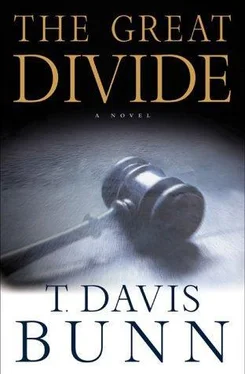T. Bunn - The Great Divide
Здесь есть возможность читать онлайн «T. Bunn - The Great Divide» весь текст электронной книги совершенно бесплатно (целиком полную версию без сокращений). В некоторых случаях можно слушать аудио, скачать через торрент в формате fb2 и присутствует краткое содержание. Жанр: Триллер, на английском языке. Описание произведения, (предисловие) а так же отзывы посетителей доступны на портале библиотеки ЛибКат.
- Название:The Great Divide
- Автор:
- Жанр:
- Год:неизвестен
- ISBN:нет данных
- Рейтинг книги:5 / 5. Голосов: 1
-
Избранное:Добавить в избранное
- Отзывы:
-
Ваша оценка:
- 100
- 1
- 2
- 3
- 4
- 5
The Great Divide: краткое содержание, описание и аннотация
Предлагаем к чтению аннотацию, описание, краткое содержание или предисловие (зависит от того, что написал сам автор книги «The Great Divide»). Если вы не нашли необходимую информацию о книге — напишите в комментариях, мы постараемся отыскать её.
The Great Divide — читать онлайн бесплатно полную книгу (весь текст) целиком
Ниже представлен текст книги, разбитый по страницам. Система сохранения места последней прочитанной страницы, позволяет с удобством читать онлайн бесплатно книгу «The Great Divide», без необходимости каждый раз заново искать на чём Вы остановились. Поставьте закладку, и сможете в любой момент перейти на страницу, на которой закончили чтение.
Интервал:
Закладка:
TEN
Marcus pulled into the Hayes drive and halted behind a new Jeep Cherokee of midnight blue. His suspicions mounted when he spotted the keys dangling from the rear door. Which was why he forgot and shut his door too hard, causing one end of the rear bumper to break free of its coat hanger and clank to the ground.
“Marcus Glenwood!” A woman’s voice shrilled. “You get that cockroach of an automobile outta my front yard!”
“Hello, Libby.”
The house door slammed like a rifle shot. “I declare to goodness, if my gardener dared show up in a heap like that I’d fire him on the spot!”
“Nice to see you again, Libby.”
Boomer’s wife was tanned and fit and strong-willed enough to keep Boomer and three college-aged kids in line. She wore the obligatory Carolina-casual uniform of a pastel Izod shirt, pleated cuffed shorts, an alligator belt with a gold buckle engraved with her initials, and Bass loafers with no socks. She marched down, circled his car, declared, “It’s worse than Boomer said.”
“Whose Jeep is this, Libby?”
“Yours, soon as you sign the papers.” She tsk-tsked her way back to where he stood. “Amazing those hoodlums let you walk away.”
“I can’t afford a new car, Libby.”
A familiar voice snapped, “Save your breath, Marcus.” Charlie Hayes limped his way down the drive. The old man lived in a second-floor apartment separated from the rest of the house by a poured-concrete wall. The wall was one of two conditions laid down by Charlie Hayes before he had agreed to move in with his son. The other was that Boomer stop threatening to cut off his oldest boy for electing to study at Wake Forest. “The title’s already in your name.”
Before Marcus could object further, Libby said, “Boomer wants to do this, Marcus. You haven’t ever won an argument with Boomer and you’re not going to start now.”
Charlie Hayes huffed to a halt and said to the Jeep, “Dang thing would have to be blue, wouldn’t it.”
“I’m paying for this,” Marcus declared.
“Of course you are.” Libby smiled up at Marcus. “Charlie told us about the Hall case. Boomer started feeling bad for everybody.”
“I haven’t taken the case yet.” It was a feeble protest, but all he could muster just then.
“You will.” This from the judge. “Get on over here and drive me to lunch. I’m hungry for some collards and fatback. Only thing I get fed around here is chicken with lemon and yogurt glop. Woman takes pleasure from squeezing out the last drop of fat.”
“Fat is bad for you,” Libby said, still smiling up at Marcus, a secret look in her clear gray eyes.
“Fat is where they hide the taste,” Charlie said, climbing into the Jeep and slamming the door.
Libby reached over and patted his arm. “Go fight the good fight, Marcus Glenwood. Do it for all us normal folk. Keep us safe in our cozy little world.”
Though he had been coming for years, the Farmers’ Market remained new and strange to Marcus. He still recalled the days of traveling here with his grandmother, carrying bushels of backyard produce in the trunk of their old Chevy. By the ripe old age of eleven he was hauling the tattered baskets of shelled peas and okra and corn and beets, setting them up according to his grandmother’s artistic eye. He earned seventy-five cents for nine sweaty hours’ work, and counted himself lucky-but not for the money. If he could have, Marcus would have paid his grandmother for the chance to be there at all.
Back then, the old Farmers’ Market had been little more than a dusty red-clay field, packed hard by decades of pickups and horse-drawn wagons before them. Because of her age, his grandmother had held a coveted spot under the open-sided shed, shielded from the sun by a roof more rust than metal. There had been a spigot off to one side where the young ones gathered, filling buckets both for drinking and for wetting down the produce. In Marcus’ memory, the children around the spigots were always laughing, his grandmother always had a kind word for her boy, and the summer sky was always so clear it appeared black off away from the sun. There had been a redheaded little darling in a flour-sack dress whose family sharecropped down Wilson way, and in his memories she was always there waiting for Marcus to arrive, always hoping for a smile and a word from the tall boy with the strange accent. Marcus remembered that now, as he drove in and parked by the new restaurant, how the redheaded girl could not get over the way Marcus spoke, his Philadelphia accent turning the words into something so foreign just his listing the produce made her laugh. Marcus followed Charlie Hayes across the parking lot and recalled that little girl and the way she would come running up to greet their dusty car with the words, “Tell me something funny, Marcus.” If only he could remember her name.
The new Farmers’ Market was positively palatial by comparison. The multitude of sheds were broad and painted bright colors, the floor paved with white concrete so it could be easily washed down. Only the farmers seemed unchanged, slow-talking and tight-faced, their skin leathery and their eyes troubled by being forced to focus on prices and change and the strange talk of city-bred folk. Marcus loved to breathe the perfume of fresh goods with the earth still clinging to their roots.
The market now held two restaurants, and they were almost always full. One had trestle tables and a fast-food counter and sold only fish. The fish came only one way-fried. Whatever they had that day-bass, shad, bream, popcorn shrimp, trout-was served with hush puppies and homemade fries and cole slaw. Beans were extra. Nobody who entered the Farmers’ Market fish restaurant a second time said anything about calories or fat content or cholesterol. There were three portion sizes to choose from, and the large portion would feed a starving nation for a month.
The other restaurant was his favorite place in the entire world. The first time he came, three days after his return from law school, it had been as the guest of federal justice Charlie Hayes. The gentleman had observed carefully as Marcus took in the concrete floor and the simple tables and the clamor and the aroma. Marcus had finally turned to the judge and said, “If I ever make it to heaven, I expect to find someplace pretty much like what they got here.” Charlie Hayes had nodded once and replied, “I believe there’s hope for you yet.” They had been friends ever since.
Marcus spent the better part of his chicken-and-dumpling lunch describing his journey to Washington and Richmond. These midday discussions had started the year of Charlie’s retirement, and were a habit so ingrained that both men took it as natural. For a querulous opinionated man who was impatient with just about everything in life, Charlie Hayes was an excellent listener, as were most good judges. He let Marcus ramble his way through, sorting things out and making verbal notes in the process.
Only over dessert and Marcus’ description of his morning encounter with Austin Hall did Charlie interrupt. “I’m not sure you did right there.”
“I had no choice.”
“Well, now. Maybe you did, maybe you didn’t. Some folks delight in leaving the hardest decisions to others. All you’ve seen is a spat between husband and wife. You don’t know if this was just a lifetime’s tango they were dancing there.”
“And I’m telling you I had no choice.” Marcus was certain of that. “Maybe you’ve got to go through it to understand.”
“Don’t even think such a thing.” Charlie pushed his half-finished dessert aside. “Look at what you’ve gone and done. Ruined a perfectly good portion of banana-cream pie with your nasty talk.”
“You can’t finish it because you ate about a pound of calf’s liver and twice that of turnips. Even Boomer would be hard-pressed to outeat you today.”
Читать дальшеИнтервал:
Закладка:
Похожие книги на «The Great Divide»
Представляем Вашему вниманию похожие книги на «The Great Divide» списком для выбора. Мы отобрали схожую по названию и смыслу литературу в надежде предоставить читателям больше вариантов отыскать новые, интересные, ещё непрочитанные произведения.
Обсуждение, отзывы о книге «The Great Divide» и просто собственные мнения читателей. Оставьте ваши комментарии, напишите, что Вы думаете о произведении, его смысле или главных героях. Укажите что конкретно понравилось, а что нет, и почему Вы так считаете.












